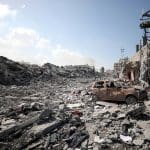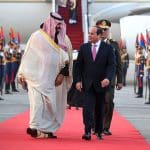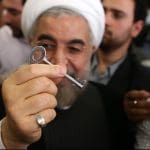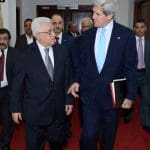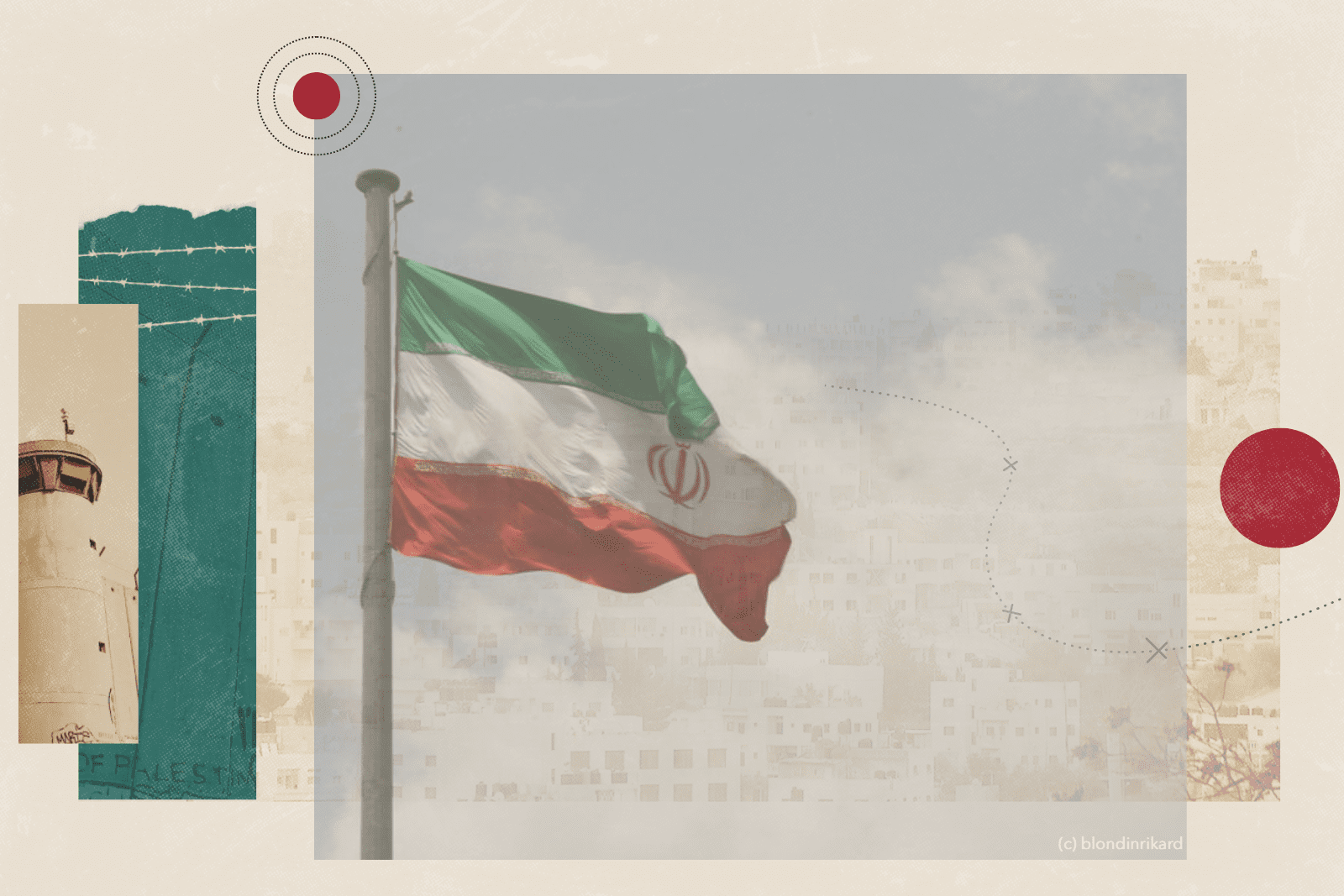
While simultaneously carrying out its ongoing genocide in Gaza, the Israeli regime attacked the Iranian embassy in Damascus, Syria, on April 1, 2024, killing seven Iranian officials. According to Iran, Israeli forces were intending to target a meeting between Iranian officials and Palestinian militants discussing resistance strategies in Gaza.1
Following the bombing, Iran promised to retaliate—and it did so 12 days later on April 13, 2024, with the launch of over 300 drones and missiles toward Israel. Between Israel’s US-funded Iron Dome air defense system and direct military support from the US, the UK, France, and Jordan, the vast majority of Iran’s barrage was intercepted before impact. Shortly after, the Iranian mission to the UN stated that the matter “can be deemed concluded.”
While it remains unclear how and when Israel will respond to Iran’s operation, regional dynamics have undoubtedly already shifted. In this roundtable, Al-Shabaka analysts Fadi Quran, Fathi Nimer, Tariq Kenney-Shawa, and Yara Hawari offer insights on the regional impact of Iran’s recent maneuver and situate the ongoing genocide in Gaza within this broader context.
The Israeli Regime’s Strategic Misstep
Fadi Quran
The large scale of Iran’s attack and diversity of both its weapons and target locations forced the Israeli regime to reveal the majority of its defense capabilities across the region, as well as those of the US. As a result, the Iranian government is now able to more effectively map out Israel’s anti-missile defense system as well as US defense installations across Jordan and the Gulf states. Moreover, Iran now has a clearer idea of the time required for Israeli forces to prepare their defense, as well as how Israeli society responds to an impending attack.
Iran claims to have informed both the US and neighboring states of the impending strike several days prior to its launch, giving Israel ample time to prepare. Thus, the operation’s goal was clearly not to cause widespread damage or casualties, but rather to acquire new tactical knowledge: Iran can now reverse-engineer the intelligence gathered from April 13th and present a far more serious counter-threat in the future. The US and Israel will therefore be forced to redesign their costly current defense model. Overall, despite being framed otherwise by the Western media, it is clear that Iran’s attack has come at a huge strategic cost to Israel.
While Israeli Prime Minister Netanyahu and his cabinet want a swift and aggressive response where they can drag in the US, the Iranians prefer a longer war of attrition that bleeds Israel of its deterrence capabilities and makes it a costly ally for those in the region. The genocide in Gaza has already created domestic tensions for various Arab regimes, and perceived support for Israel against Iran—as is the case for the Jordanian monarchy—is only exacerbating these internal rifts.
Despite being framed otherwise by the Western media, it is clear that Iran’s attack has come at a huge strategic cost to Israel Share on X
When it comes to Gaza, the question of the impact of Iran’s strike depends largely on how Israel’s allies respond. US and European leaders, who have made it clear that they are not interested in a regional war, could use Israel’s recklessness as an opportunity to exert more pressure on Netanyahu for a ceasefire and regional de-escalation.
Conversely, if Israel succeeds in reframing the current context as part of an ongoing cold war between itself and Iran, the US may concede more space for it to continue its atrocities in Gaza. Regardless of the US position, the possibility remains for the Israeli war cabinet to escalate with Iran, as doing so serves the political interests of those in power, and may be their last attempt at reimposing a deterrence framework that was shattered on October 7th.
Shifting Regional Dynamics
Fathi Nimer
To make the assumption that Iran’s strike on the Israeli regime was merely theatrics is to underestimate the significance of this recent escalation. Iran successfully targeted at least one Israeli air base and compelled Israeli forces to exhaust key defensive resources at a time of global munitions shortage. Even more significant is the fact that the Iranian response indicates a serious collapse of US and Israeli deterrence in the Middle East. Such a strategy has historically been based on the assumption that the mere threat of US military power was sufficient to deter confrontation with its allies. Not since the 1973 War has this strategy been ruptured so significantly.
This shift in geopolitics should not be taken lightly. The Iranian strike, combined with the Houthi blockade of the Red Sea and Hezbollah’s continuous strikes on Israel, prove that there is a reshuffling of armed power occurring in the region. This changing dynamic is the culmination of almost two decades of training and advancements in the capabilities of these groups, to the extent where they now pose a real threat to the Israeli regime and global interests in the region.
(Iran's strike) was not an end in itself, but the beginning of a new phase of willingness to confront the Israeli regime in light of waning US power Share on X
The Palestinians are inevitably a part of this shift. When Hamas first reoriented its strategy towards manufacturing its own missiles, they were derided as primitive and ineffective. Almost two decades later, however, these missiles have evolved into a sophisticated strategic threat to Israel. The significance of this progression was not immediately felt through a sudden military utility, but rather became clear over time through Hamas’s ability to continually adjust its resistance tactics. We should understand Iran’s strike through a similar lens: It was not an end in itself, but the beginning of a new phase of willingness to confront the Israeli regime in light of waning US power.
The strike also laid bare the current state of affairs across the region, highlighting the positions of Arab states who have normalized relations with Israel. In doing so, Iran effectively pierced through the empty rhetoric of those Arab regimes who have offered words of solidarity with Gaza over the past six months while simultaneously building closer ties to Israel behind the scenes. These new alliances should also help to dispel identitarian notions of politics in the Middle East and reframe regional dynamics for what they truly are: a struggle between those invested in imperialism and colonialism, and those striving for liberation.
Distraction from the Gaza Genocide
Tariq Kenney-Shawa
Iran’s highly-choreographed attack achieved exactly what it intended: gaining valuable intel on Israeli, American, and regional air defense capabilities; costing Israel and its US benefactors over $1 billion in a single night; proving Israel’s dependency on the US; and further eroding Israel’s image of military invincibility. In doing so, Iran also sent a clear message that its drones and missiles could cause significantly more damage if launched without warning, while still preserving a window for de-escalation.
It’s important to understand that Iran acted for its own interests on April 13th, not in response to Israel’s massacre of more than 33,000 Palestinians. There is also no doubt that Iran’s attack has already diverted attention away from Israel’s genocide in Gaza, and will temporarily stifle growing calls to condition or cut military aid to Israel. Indeed, little attention was paid to reports of Israeli forces opening fire on Palestinians in northern Gaza just hours after Iran’s attack concluded. Meanwhile, Israel will use this opportunity to double down on its position as a David versus a region of Goliaths, despite being a nuclear-armed regional military hegemon. Thus, while Iran’s operation was self-serving, it likewise presented a perfect distraction for Israel from its genocidal assault on Gaza and mounting calls for accountability.
Israel will seize the current regional escalation as an opportunity to distract the world from its genocide campaign in Gaza and the US will continue do nothing to stop it Share on X
Even so, while calls to condition Western military aid have indeed grown, the weapons deliveries have continued uninterrupted. The truth is, the international narrative shift, momentous as it may be, has amounted to little more than rhetoric. Palestinians continue to be massacred by Israeli forces in broad daylight, with or without Iran’s global distraction.
Israel has made clear its determination to respond to Iran’s retaliatory strikes with further escalation. While President Biden has insisted that US forces will not participate in further Israeli attacks on Iran, he continues to refuse to impose red lines on Israel. Regardless of Biden’s warnings, it is highly unlikely that the US will leave Israel on its own to navigate a future attack against Iran or a subsequent defense. What is clear is that Israel will seize the current regional escalation as an opportunity to distract the world from its genocidal campaign in Gaza and the US will continue to do nothing to stop it.
The Scapegoating of Netanyahu
Yara Hawari
For Netanyahu, picking a fight with Iran was the only thing that could save him from near-certain political demise. As the Gaza genocide rages on, the Israeli military remains unable to secure its stated objective: the eradication of Hamas and the return of the hostages. This, in addition to the fact that he faces major corruption charges and overwhelming domestic opposition to his leadership, makes Netanyahu at his most dangerous.
The Israeli prime minister has, for years, built his political career on arousing fear of Iran and its nuclear capabilities among the Israeli public. Internationally, the Israeli regime has long positioned itself as a Western bulwark against Iran and tied its security to that of Western civilization itself. Netanyahu has also exploited Palestine-Iran relations to justify Israel’s continued oppression of the Palestinian people as a whole. This is a narrative that has particularly taken hold since the start of the current genocide.
Still, in the process of scrutinizing Israeli leadership, it is important to avoid the trap of scapegoating Netanyahu. Indeed, many are doing so with fervor, blaming both the genocide and the escalation with Iran squarely on the sitting prime minister. This accusation has been championed primarily by Western liberals, including US Senator Bernie Sanders, who has led the charge against “Netanyahu’s war machine.” Such calls have been echoed across Europe, with leaders framing Israel’s genocide as Netanyahu’s project.
To focus solely on (Netanyahu) is to ignore the whole apparatus that has enabled the Israeli regime to continue so violently and unabated Share on X
Netanyahu himself is undoubtedly a war criminal, who should be held accountable for his role in the ongoing genocide against Palestinians in Gaza. But to focus solely on him is to ignore the whole apparatus that has enabled the Israeli regime to continue so violently and unabated. The “war machine” that Sanders and others have erroneously attributed to the Israeli prime minister is a well-oiled system that has been fine-tuned by numerous Israeli leaders long before Netanyahu came to power. It is a structure independent of any particular individual, rooted in the dehumanization and obliteration of Palestinians, and one that reaches well beyond the military regime itself. This is why, unsurprisingly, a recent poll revealed that 88% of Israeli Jews think the number of Palestinians killed in Gaza is justified, and some 43% believe that the army is not using enough fire power.
Nonetheless, the scapegoating of Netanyahu has persisted in light of the recent escalation with Iran, with some reducing the Israeli regime’s bombing of the Iranian embassy to “Netanyhau’s warmongering.” This approach is a rather predictable feature of Western liberal politics, which often relies on the individualization of systemic problems. Accordingly, it is a convenient tactic that serves to obscure the reality that Israel’s current genocide and warmongering are the outcome of a violent Zionist settler colonial project. It also serves to shield third state actors from complicity in both the genocide and instability in the region: If they can blame it all on one man, the only solution required is his ousting.
- To read this piece in French, please click here. Al-Shabaka is grateful for the efforts by human rights advocates to translate its pieces, but is not responsible for any change in meaning.
Yara Hawari is Al-Shabaka’s co-director. She previously served as the Palestine policy fellow and senior analyst. Yara completed her PhD in Middle East Politics at the University of Exeter, where she taught various undergraduate courses and continues to be an honorary research fellow. In addition to her academic work, which focused on indigenous studies and oral history, she is a frequent political commentator writing for various media outlets including The Guardian, Foreign Policy, and Al Jazeera English.
Tariq Kenney-Shawa is Al-Shabaka’s US Policy Fellow and co-host of Al-Shabaka’s Policy Lab series. He holds a Masters degree in International Affairs from Columbia University. Tariq’s research and writing have covered a range of topics, from the role of open-source intelligence in exposing Israel’s war crimes to analysis of Palestinian liberation tactics. His writing has appeared in The Los Angeles Times, Foreign Policy, and The Nation, among others. Follow Tariq on Twitter @tksshawa and visit his website at https://www.tkshawa.com/ for more of his writing and photography.
Fathi Nimer is Al-Shabaka’s Palestine policy fellow. He previously worked as a research associate with the Arab World for Research and Development, a teaching fellow at Birzeit University, and a program officer with the Ramallah Center for Human Rights Studies. Fathi holds a master’s degree in political science from Heidelberg University and is the co-founder of DecolonizePalestine.com, a knowledge repository for the Palestinian question. Fathi’s research revolves around political economy and contentious politics. His current focus is on food sovereignty, agroecology, and the resistance economy in Palestine.
Al-Shabaka Policy Member Fadi Quran is a Senior Campaigner at Avaaz and a Popular Struggle community organizer. He previously served as UN Advocacy Officer with Al-Haq’s legal research and advocacy unit. Apart from his work in advocacy and international law, Fadi is also an entrepreneur in the alternative energy field, where he has founded two companies bringing wind and solar energy to Palestine and other countries in the region. Fadi holds degrees in Physics and International Relations from Stanford University.











